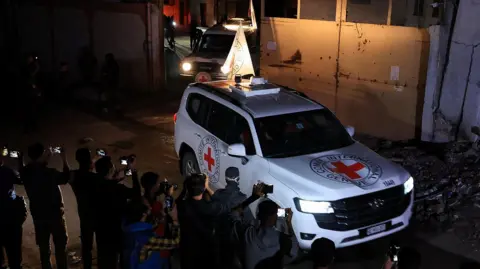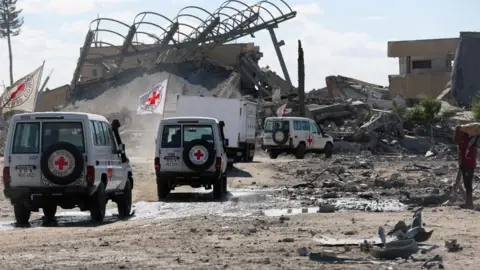Pauline Cola and
Chris Graham
The Israeli army said that Hamas had returned the bodies of four other deceased hostages, and work was underway to determine their identities.
The Red Cross recovered the remains from the coffins and handed them over to the Israeli army late Tuesday night.
The transfer came after Israel warned that it would restrict aid to Gaza until Hamas returned the bodies of all 28 dead hostages. The Palestinian armed group handed over 20 hostages alive and four dead on Monday.
The Red Cross announced in a statement that the remains of 45 deceased Palestinians who were detained in Israel were returned to Gaza on Tuesday.
Israel identified the four deceased hostages released by Hamas on Monday as Daniel Peretz, 22; Yossi Sharabi (53); Guy Illouz, 26 y Bipin Joshi, 23 years old, Nepalese citizen.
The IDF office said the process of identifying the final four hostages was underway.
US President Donald Trump’s ceasefire plan, which was accepted by both Israel and Hamas, stipulates that the handover of all 48 hostages will be completed by noon on Monday.
While all living hostages have been returned, pressure is mounting on Hamas and the Israeli government over the remains of the 20 hostages that Hamas has not yet recovered. Palestinians are increasingly concerned that Hamas’ delay in returning the bodies could lead to uncertainty about the future of the ceasefire.
 Reuters
ReutersThe Israeli army said in a statement on Tuesday: “Hamas is required to fulfill its part of the agreement and make the necessary efforts to return all hostages to their families and give them a decent burial.”
The Israeli Defense Minister warned the Palestinian armed movement that “any deliberate delay or avoidance will be considered a flagrant violation of the agreement and will be responded to accordingly.”
Israeli officials said they decided to restrict aid and delay plans to open the Rafah border crossing with Egypt because Hamas violated the ceasefire agreement by not handing over the bodies of the hostages.
Hamas says it had difficulty finding the remains of the dead hostages.
A version of the ceasefire agreement, published by Israeli media last week, appears to acknowledge that Hamas and other Palestinian factions may not be able to locate all the bodies within the original time frame.
An Israeli official suggested that an international task force begin work to locate the remains of anyone who has not been returned.
“A great burden has been lifted, but the mission is not finished. The dead have not been brought back, as promised! The second phase begins now!!!” Trump said on the tenth.
Several Palestinians told the BBC they were concerned that Hamas’ delay in returning all the bodies of Israeli hostages and subsequent violence could threaten the ceasefire and derail the start of the second phase of negotiations.
Tayseer Abed, a well-known Gaza writer who recorded the war from his tent in Khan Yunis, described the confrontation as “a serious test of the ceasefire,” warning that if the delay continued and Israel refused to move to the next phase, “the issue of bodies could become the fuse that ignites a new round of conflict.”
Nearly 2,000 Palestinian prisoners and detainees were released as part of the 20-point peace plan, which the US president described as an end to the two-year war.
The first phase of Trump’s plan saw the ceasefire go into effect at 12:00 (09:00 GMT) on 10 October.
Israeli Prime Minister Benjamin Netanyahu told CBS, the BBC’s US partner, that he remained optimistic about a peaceful next phase in the talks between Israel and Hamas.
But he said Trump’s terms were “very clear” that Hamas must disarm or “all hell will break loose.”
“First, Hamas must give up its weapons,” Netanyahu said. “And secondly, you want to make sure that there are no weapons factories inside Gaza. There is no smuggling of weapons into Gaza. This is disarmament.”
Trump also increased pressure on Hamas to give up weapons. The US President said, “They will lay down their weapons, because they said they would lay down their weapons. If they do not lay down their weapons, we will disarm them.”
While the ceasefire has largely held, Palestinian Civil Defense told the BBC that seven people were killed by Israeli forces on Tuesday in two separate incidents – in eastern Gaza and east of Khan Yunis.
Wafa News Agency, citing a medical source, said that an Israeli drone strike in the Shujaiya neighborhood in eastern Gaza resulted in the deaths of five people. The Israeli army said it opened fire after people crossed the yellow line, to which its forces had withdrawn under Trump’s ceasefire plan.
Meanwhile, Hamas fighters showed they were reasserting control over Gaza, where reports of masked gunmen publicly executing eight Palestinians sparked fear and anger among residents.
While Hamas asserts that its fighters are working to “restore security” and “eliminate chaos,” many fear that the group will use the chaos to settle scores with its rivals and silence critics.
 Reuters
ReutersTrump I signed the declaration on MondayAlong with the leaders of Egypt and Qatar – the main mediators – and Turkey, which played an important role in the final stages of the indirect negotiations between Israel and Hamas.
British Prime Minister Sir Keir Starmer and French President Emmanuel Macron were among more than 20 world leaders who attended the conference, including many from Islamic and Arab countries. Netanyahu and Hamas did not participate.
The plan calls for Gaza to be initially run by a transitional committee of Palestinian technocrats overseen by a “peace council,” before authority is eventually transferred to the Palestinian Authority once it undergoes reforms.
But difficult negotiations will be needed to move forward with the final stages of the plan.
Among the points of contention are the extent and timetable for the withdrawal of Israeli forces, the disarmament of Hamas, and the future governance of the Gaza Strip.
Hamas has previously said it will not disarm unless a Palestinian state is established, and has rejected the idea of foreign rule in Gaza.
The Israeli military launched a campaign in Gaza in response to the Hamas-led attack on southern Israel on October 7, 2023, in which approximately 1,200 people were killed and 251 others were taken hostage.
At least 67,869 people have been killed in Israeli military operations in Gaza since then, according to the Hamas-run Health Ministry in the Strip.
https://ichef.bbci.co.uk/news/1024/branded_news/5c7f/live/34998630-a980-11f0-92db-77261a15b9d2.jpg
Source link
